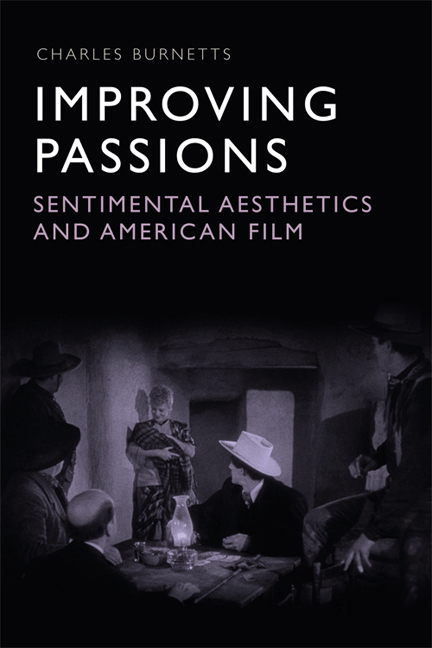Book contents
- Frontmatter
- Contents
- Acknowledgements
- Introduction
- 1 Towards a Genealogy of Sentimentalism in the Eighteenth and Nineteenth Centuries
- 2 Sentimental Aesthetics and Classical Film Theory
- 3 The Sentimental Chaplin: Comedy and Classical Narrative
- 4 Affect, or Postmodern Sentimentalism
- 5 The Sentiments of War in Spielberg and Tarantino
- 6 Sentiment and the ‘Smart’ Melodrama
- Conclusion
- Bibliography
- Index
1 - Towards a Genealogy of Sentimentalism in the Eighteenth and Nineteenth Centuries
Published online by Cambridge University Press: 20 December 2017
- Frontmatter
- Contents
- Acknowledgements
- Introduction
- 1 Towards a Genealogy of Sentimentalism in the Eighteenth and Nineteenth Centuries
- 2 Sentimental Aesthetics and Classical Film Theory
- 3 The Sentimental Chaplin: Comedy and Classical Narrative
- 4 Affect, or Postmodern Sentimentalism
- 5 The Sentiments of War in Spielberg and Tarantino
- 6 Sentiment and the ‘Smart’ Melodrama
- Conclusion
- Bibliography
- Index
Summary
Standing all alone in the midst of the business and bustle of the street, the house looked a picture of cold desolation; and Kit, who remembered the cheerful fire that used to burn there on a winter's night and the no less cheerful laugh that made the small room ring, turned quite mournfully away.
It must be especially observed in justice to poor Kit that he was by no means of a sentimental turn, and perhaps had never heard that adjective in all his life. He was only a soft-hearted grateful fellow, and had nothing genteel or polite about him; consequently, instead of going home again, in his grief, to kick the children and abuse his mother (for, when your finely strung people are out of sorts, they must have everybody else unhappy likewise), he turned his thoughts to the vulgar expedient of making them more comfortable if he could.
(Dickens, The Old Curiosity Shop, 2001: 105–6)This passage reveals the sentimental here as a mere mask of gentility in Dickens’ world, the underside of which is characterised precisely as the cruelty of abusing one's own family members. To be ‘soft-hearted’ and ‘grateful’ is contrasted here with the artifices of a ‘sentimental turn’ – the latter is a socially appropriate reaction to Little Nell's absence from her house, while Kit's feelings are genuine and true. Dickens is clearly in sympathy here with those who may never have heard of the word ‘sentimental’ or learnt its codes of appropriate emotionality, and contrasts them with a ‘finely strung’ class who have learnt its mannerisms but are in essence morally bankrupt. This framing of sentimentality echoes that described by philosopher Mary Midgley, who equally aligns its codes with an attitude of ‘brutality’ (1979), as echoed furthermore in Oscar Wilde's dismissal of sentimentality as the mere ‘bank holiday of cynicism’ (2005: 353).
Nevertheless, to be be ‘sentimental’, or to have ‘sensibilité’, would be associated in the mid-eighteenth century with the cultivating of precisely that sympathy written of in relation to Kit: a goodwill towards the other and a moral purity of spirit towards reform and the alleviation of misfortune.
- Type
- Chapter
- Information
- Improving PassionsSentimental Aesthetics and American Film, pp. 22 - 51Publisher: Edinburgh University PressPrint publication year: 2017

